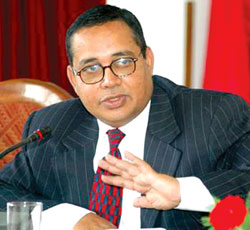On 25 July, parliament directed the government to ratify the Rome Statute that created the International Criminal Court (ICC) in 2002. Representatives of NGOs forming the Asian Delegation for the ICC were here 25-27 August to lobby the government to take that next step.
Nepali Times: Why are you here now? 
INSEC
Ahmed Ziauddin: Nepal was supposed to accede to the treaty long ago but then came the king's axe and everything stopped. So now we're resuming that long-overdue process. In a way we're also managing expectations. People say "there's the new court. It will solve all our problems." But we say "no."
You met the prime minister and other political leaders but you didn't meet the Maoists.
We had a meeting scheduled but they didn't come. One of the comments we heard is that they understand all the implications of the court, but they're not really confident about their future, so they're slightly hesitant. Nobody has to worry about whatever happened in the past because the ICC deals only with those who commit very serious crimes, such as genocide. What is more important for them to understand is that we are here talking about
how to ensure a secure, democratic future for Nepal.
Are you saying no crimes were committed during the conflict that would come under ICC jurisdiction: genocide, crimes against humanity or war crimes?
My personal belief is that there were no crimes against humanity or genocide committed. Yes, torture is a war crime and it's very, very serious. In that sense, the Maoists are vulnerable; one can argue there's been widespread (human rights) violations. But then again, the (ICC) Prosecutor must analyse and put all of this into the international context-what's happened in places like Rwanda, Democratic Republic of the Congo, Darfur. No doubt what happened in Nepal was horrible, but the scale, nature, and intensity is not at the top of that league. Realistically, we don't expect the Maoists to be before the court.
Have you been approached about taking particular cases to the Court?
No, not at all. In the last couple of days no one has talked about 'revenge'. The prime minister didn't say a word about the king. Even the former prime minister (Sher Bahadur Deuba) didn't say anything about him until one of our NGO friends mentioned that he had been jailed by the king.
Will the treaty be ratified retroactively?
If it chooses, the government can 'predate' its ratification to 2002 or possibly earlier. That doesn't mean the court would entertain an application-it has stringent standards. From the discussions we had, the government has no intention to predate it.
What are you especially concerned about?
We have to guard against an 'impunity gap'. The ICC will be dealing with only a few cases; 99.9 percent of cases are dealt with in national courts. If governments don't have proper laws and the intention to prosecute, criminals could commit major crimes and afterwards face no consequences. Our mission is to help strengthen Nepal's legal system.
What about the past?
The people of Nepal and the government must decide on how to deal with the past. I understand there will be a major conference here on transitional justice in October. Afghanistan and East Timor are still having problems, and they didn't deal with the past. It's very important to have some sort of resolution and, more importantly, to have development. In order to develop, you need better laws. You need to create hope to keep extremists at bay. If people become disappointed, very likely the Maoists will reappear.


